British election: Labour’s big problem is not its policies but Jeremy Corbyn
Asked to compare Jeremy Corbyn to a fictional character, voter focus groups chose Where’s Wally?
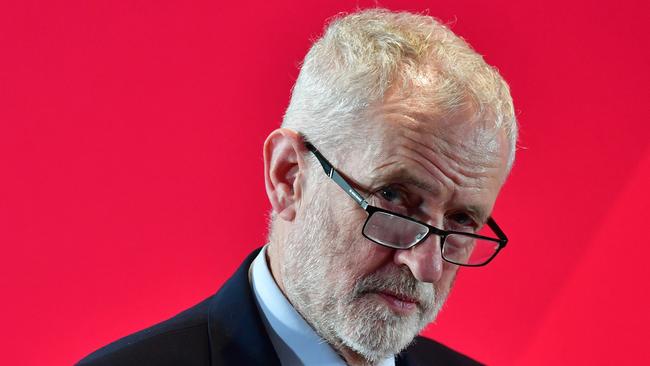
“Vote Labour, get a microwave”. That was how David Axelrod, a former adviser to Barack Obama, described the party’s political strategy when he was working for Ed Miliband in the run-up to the 2015 general election. Jeremy Corbyn has taken the “prizes every time” approach to politics to a new level with a bonanza of spending commitments. There will be free broadband, free tuition fees, free prescription charges, free dental checks, free hospital parking, free childcare and more charging points for electric cars if he gets to No 10. It’s Vote Labour, get a microwave, fridge-freezer and cappuccino machine — paid for by higher taxes on nasty bankers and big corporations.
READ MORE: Boris Johnson and Donald Trump firm as masters of their universe | Johnson shelves Tories’ tax cuts | ‘Boris treating me like a fleeting one-night stand’
Many of the consumer-friendly policies in Labour’s manifesto will be popular with voters who are tired of endless rows about Brexit. Everybody likes free stuff and most people will be happy to see the super-rich being squeezed to fund the giveaway. Despite the business backlash to the proposed part-nationalisation of BT, it is John McDonnell’s promise to “eliminate bills for millions of people” that will cut through. Labour’s attacks on tax dodgers, zero-hours contracts and “rip-off” energy prices and rail fares will also resonate. A YouGov poll this month found that more than half of voters agree that nobody should be a billionaire and three quarters believe the richest should pay more tax.
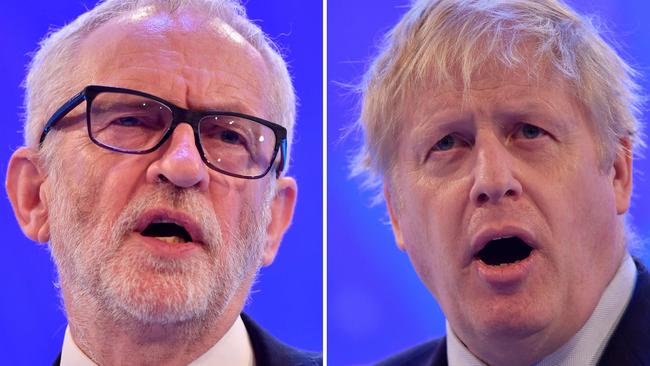
The Conservatives are in no position to criticise Labour for bribing the electorate with its own money because they are doing the same, just less well. They have ripped up their own fiscal rules and intend to borrow billions of pounds to pour into infrastructure and the public services. Indeed, the credit ratings agency Moody’s recently changed its outlook for the UK’s credit rating from stable to negative, partly because both main parties are planning to raise spending with “no clear plan” to finance it. The Tories’ dodgy dossier suggesting that Labour’s policies would cost £1.3 trillion was riddled with inaccuracies and double-counting. On the National Health Service, social care, the environment and housing, the opposition has plans with more appeal than its Marxist economics.
Labour’s problem is not its policies but its leader. The television debates, which start on Wednesday, are a reminder that elections are not just about manifesto pledges, they are also about personality. Leaders are like the daemons in Philip Pullman’s His Dark Materials — they sit on the shoulders of their parties during the campaign and are the embodiment of their character.
Deborah Mattinson, a former pollster for Gordon Brown and founder of the research and strategy consultancy Britain Thinks, believes that “retail” politics are always trumped by the leadership question in the end. “There is no election since 1979 when the least popular leader went on to win more seats,” she says. “You can offer people whatever you like but if they don’t trust you to deliver it then that’s useless and the more you offer, the more sceptical they will become.”
She points out that even in 2017, when Theresa May ran a terrible campaign and Mr Corbyn exceeded expectations, the Tory leader went into the election slightly ahead and won more seats. Margaret Thatcher and Tony Blair were both way ahead of their rivals in the run-up to their landslide victories in 1983 and 1997.
It is clear who has the advantage now. Boris Johnson may be a deeply divisive figure, with poorer ratings than any prime minister at a similar stage in their premiership, but Jeremy Corbyn is the most unpopular leader of the opposition in polling history.
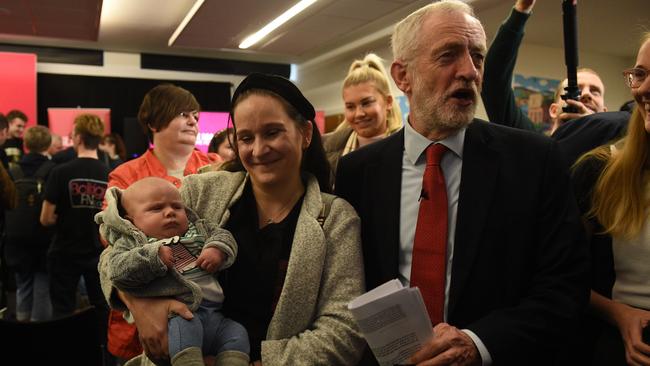
According to the YouGov “favourability” tracker, he has a rating of minus 42 compared with minus six for the Tory leader. Only 22 per cent of voters think he would make the best prime minister. In fact many of his own candidates privately admit that they do not want him to get to Downing Street because they fear his instincts on national security, while 87 per cent of British Jews believe he is antisemitic.
There are also widespread concerns about his strength and competence. When Britain Thinks created a word cloud out of comments made in focus group discussions about Mr Corbyn, it showed that “weak” was the dominant impression, closely followed by “fence-sitter” and “racist”. Although two years ago many thought he was “genuine”, now “liar” is a more frequent description. Asked to compare the Labour leader to a fictional character, the focus groups chose Where’s Wally? As one participant explained: “I thought he was a breath of fresh air . . . But when Brexit happened he was a bit silent and I didn’t know where he was with it.”
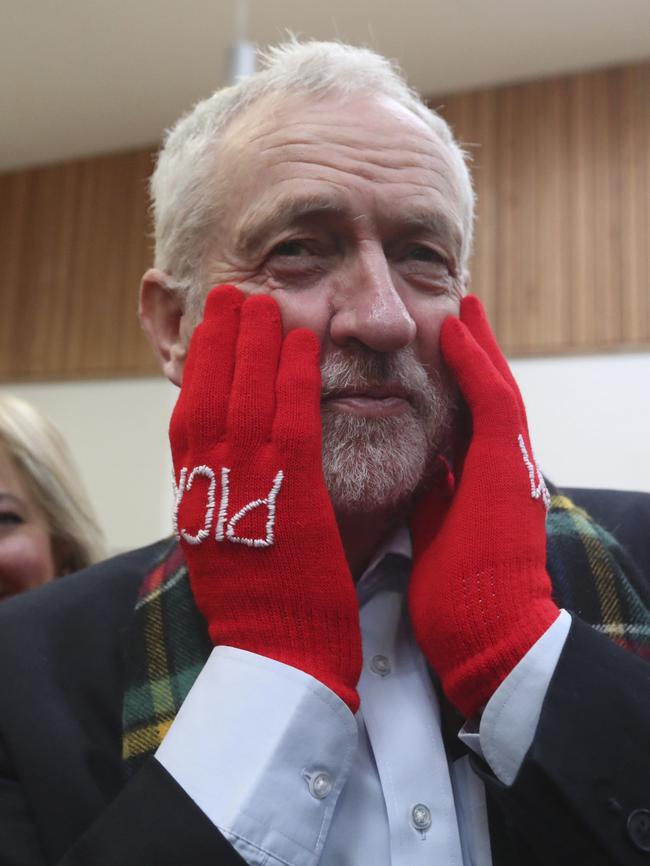
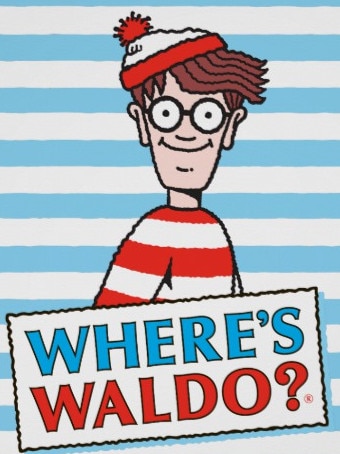
One shadow cabinet minister says: “If you poll, ‘Who do you trust on the NHS: Johnson or Corbyn?’ Johnson is ahead. If you ask people to choose between Labour and the Conservatives, Labour is ahead. It shows quite dramatically what happens when you attach things to Corbyn and that chimes with what we are picking up around the country.”
On the doorstep Labour candidates have been shocked though not surprised by the extent of the hostility to Mr Corbyn. “The election is being written up as being about Brexit-supporting voters in the Midlands and the north of England considering voting Tory because of Brexit, but the thing that comes up more in those areas is Corbyn,” says one. “They think he’s a communist who supported the IRA. They hate the Tories but they say, ‘I can’t stand your leader’.”
The rules are being broken in politics all the time, so the leaders’ relative ratings may not determine the result on December 12. There is so much uncertainty, in fact, that “don’t know” has higher ratings in polls of “who would make the best prime minister” than either Mr Johnson or Mr Corbyn.
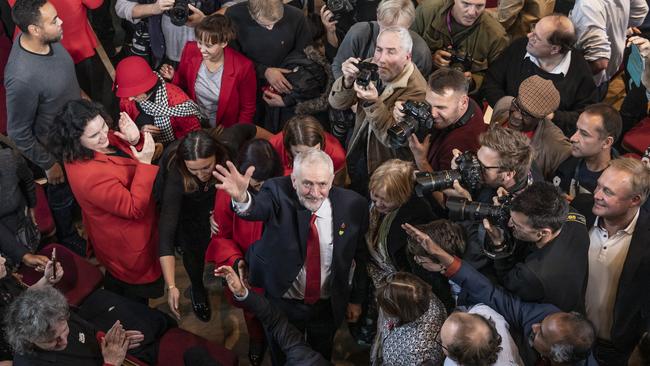
The Labour leader is almost certain to perform better than predicted in the television debates because expectations of him are so low. Mr Johnson has a tendency to ramble and his much-vaunted charisma doesn’t really come across on the small screen. The prime minister’s relationship with the American businesswoman Jennifer Arcuri — or someone else — could yet blow up in his face.
Brexit has scrambled the traditional allegiances and there will be much more tactical voting than in previous elections, which could give a boost to the Labour leader in some seats. But shadow cabinet ministers believe time is running out. “Labour desperately needs to turn things around this week,” one says. “We are treading water, we haven’t managed to inject the same energy into the campaign that we had in 2017. If nothing changes in the next few days, Johnson is going to win with a majority.”
THE TIMES



To join the conversation, please log in. Don't have an account? Register
Join the conversation, you are commenting as Logout